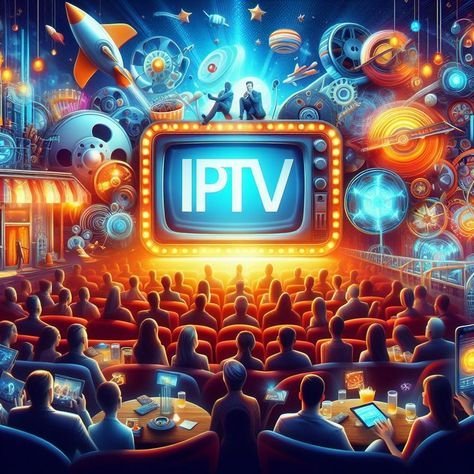Table of Contents
What is 4K IPTV?

4K IPTV stands for Internet Protocol Television that delivers content in 4K resolution. IPTV itself is a method of streaming television content through the internet, rather than traditional methods like cable or satellite.
What Does 4K Mean?
4K, also known as Ultra High Definition (UHD), refers to a screen resolution of 3840 x 2160 pixels. This resolution provides four times the number of pixels as Full HD (1080p), resulting in a much sharper and clearer picture.
How Does 4K IPTV Work?
4K IPTV works by streaming video content over the internet in a 4K resolution. Unlike traditional broadcast methods, IPTV delivers content through a data stream, which means that the quality of the stream depends on your internet connection.
Benefits of 4K IPTV
Superior Picture Quality
4K IPTV offers an exceptional viewing experience due to its high resolution. With 3840 x 2160 pixels, the picture quality is significantly better compared to HD or Full HD.
Benefits include:
- Sharper Images: The increased pixel density provides greater detail.
- Better Color Accuracy: More pixels mean a more accurate representation of colors.
- Improved Contrast: Better contrast ratios enhance depth and realism.
Enhanced Viewing Experience
Watching content in 4K provides a more immersive experience. The clarity and detail allow viewers to see more of the scene, making it feel as though they are part of it.
Advantages include:
- Crisp Details: Fine textures and intricate details are more visible.
- More Immersive: The overall viewing experience is more engaging and lifelike.
Future-Proof Technology
4K technology is considered future-proof because it is becoming the standard for high-quality video. As more content becomes available in 4K, having a 4K IPTV setup ensures that you’re ready for the future of television.
Reasons to consider 4K IPTV:

- Growing Content Library: More channels and streaming services are offering 4K content.
- Enhanced Longevity: Investing in 4K technology means your setup will remain relevant for years.
How Does 4K IPTV Work?
Technical Requirements
To enjoy 4K IPTV, you need to meet specific technical requirements:
- Internet Speed: A minimum of 25 Mbps is recommended for smooth 4K streaming.
- Hardware: A 4K-compatible TV and a streaming device that supports 4K resolution are essential.
Recommended Equipment:
| Equipment | Description |
|---|---|
| 4K TV | Television with a resolution of 3840 x 2160 |
| Streaming Device | Device that supports 4K streaming |
| High-Speed Internet | Minimum 25 Mbps for uninterrupted streaming |
Content Delivery
4K IPTV delivers content over the internet through data packets. This method allows for flexibility in accessing live and on-demand content, as opposed to traditional cable or satellite methods.
Types of 4K IPTV Content:
- Live TV: Real-time streaming of television channels.
- On-Demand: Ability to watch movies and shows anytime.
Compression and Quality
4K content is often compressed to fit within the bandwidth constraints of the internet. While compression is necessary for streaming, it can affect picture quality. However, advancements in compression technology continue to improve the streaming experience.
Compression Technologies:

- HEVC (H.265): More efficient compression compared to older methods.
- VP9: Another compression standard used for streaming high-definition content.
Choosing the Best 4K IPTV Service
Top Providers and Plans
Several providers offer 4K IPTV services. When choosing a service, consider factors like channel availability, pricing, and customer support.
| Provider | Key Features | Price Range |
|---|---|---|
| IPTV Provider A | Extensive channel list | $20/3months |
| IPTV Provider B | High-quality 4K content | $30/6 months |
| IPTV Provider C | User-friendly interface | $49/12 months |
Key Features to Look For
When selecting a 4K IPTV service, ensure it offers:
- Wide Range of Channels: Including your favorite local and international channels.
- High-Quality Streaming: Consistent 4K quality without buffering.
- User-Friendly Interface: Easy navigation and intuitive controls.
- Reliable Customer Support: Accessible and helpful customer service.
Reviews and Ratings
Reading reviews and ratings can provide insights into the reliability and performance of 4K IPTV services. Look for customer feedback on:
- Streaming Quality: How often do users experience issues?
- Customer Service: Responsiveness and effectiveness of support.
- Value for Money: Is the service worth the subscription fee?
Setting Up 4K IPTV
Equipment and Installation
Setting up 4K IPTV involves several steps:
- Connect Equipment: Connect your 4K TV and streaming device using HDMI cables.
- Set Up Internet Connection: Ensure your internet connection is active and meets speed requirements.
- Install the IPTV App: Download and install the app provided by your IPTV service.
- Configure Settings: Follow the setup instructions to configure your IPTV settings.
Setup Checklist:
- 4K TV
- Streaming Device
- HDMI Cables
- Internet Connection
- IPTV App
Troubleshooting Common Issues
Common issues with 4K IPTV and their solutions include:
- Buffering: Ensure your internet speed meets the required bandwidth.
- Poor Picture Quality: Check if the 4K settings are enabled and properly configured.
- Connection Issues: Restart your modem and router.
Troubleshooting Tips:
- Restart Equipment: Sometimes a simple restart can resolve connectivity issues.
- Check Cables: Ensure all cables are securely connected.
- Contact Support: Reach out to customer support for persistent issues.
Comparing IPTV to Other Streaming Options
IPTV vs. Cable TV
IPTV Advantages:
- Flexibility: Watch content on multiple devices and locations.
- Variety: Access a wider range of channels and on-demand content.

Cable TV Advantages:
- Reliability: Less dependent on internet speed.
- Local Channels: Often includes a comprehensive selection of local channels.
IPTV vs. Satellite TV
IPTV Benefits:
- No Satellite Dish Required: Stream directly over the internet.
- Easy Access: Watch from any internet-connected device.
Satellite TV Benefits:
- Stable Signal: Less affected by local internet issues.
- Wide Coverage: Available even in remote areas.
IPTV vs. Streaming Services
IPTV Comparison:
| Feature | IPTV | Streaming Services |
|---|---|---|
| Content Variety | Extensive channel list | On-demand content |
| Device Compatibility | Multiple devices supported | Varies by service |
| Cost | Subscription-based | Monthly or per-title fees |
Streaming Services Advantages:
- On-Demand: Watch movies and shows anytime.
- Content Variety: Access a wide range of exclusive content.
Future of IPTV
Upcoming Trends
IPTV is evolving with advancements in technology. Expect to see:
- Enhanced Picture Quality: Improvements in streaming quality and resolution.
- More 4K Content: Increased availability of 4K channels and on-demand options.
Impact of 5G Technology
The rollout of 5G technology is expected to enhance IPTV experiences by:
- Faster Speeds: Reducing buffering and improving streaming quality.
- Increased Bandwidth: Supporting higher-resolution content with less latency.
Conclusion
In conclusion, IPTV offers a superior viewing experience with its high-resolution content and flexibility. By choosing the right service and setting up your equipment correctly, you can enjoy an immersive and future-proof entertainment experience. As technology continues to advance, 4K IPTV will remain at the forefront of television innovation.

Call to Action: Explore different 4K IPTV services, consider upgrading your equipment, and enjoy the cutting-edge world of 4K television.
